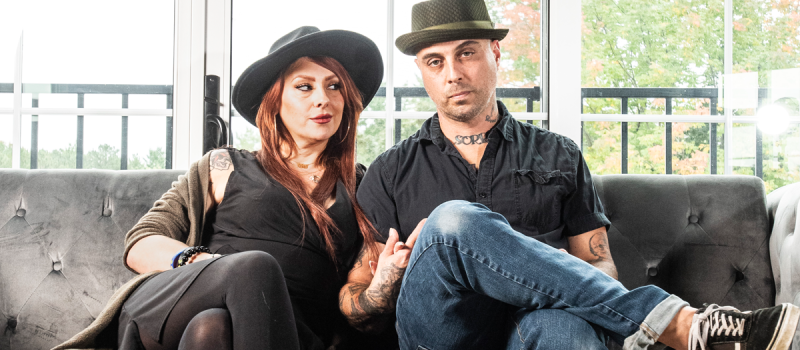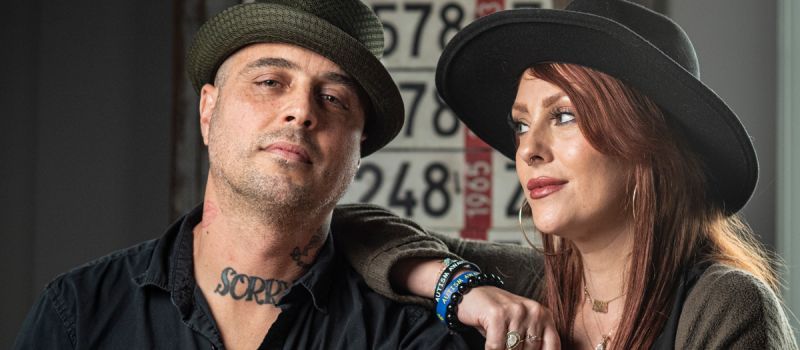B&W: NOVEMBER FEATURE
SORRY, NOT SORRY
How one former rock and roller says THC and Rick Simpson Oil helped save his life

WORDS / SAM PFEIFLE
PHOTOS / MATT ROBBINS PHOTOGRAPHY
PHOTOS / MATT ROBBINS PHOTOGRAPHY
Scott Sorry thought he had lyme disease. Or something.
“I couldn’t make a peanut butter and jelly sandwich,” he remembers. It was 2017. And he felt like shit.
It wasn’t that he’d lived a super healthy life, either. A singer/songwriter/guitarist/bassist by trade, Sorry had spent a good decade playing punk and heavy rock and roll for a living in bands like Brides of Destruction (he took over for Nikki Sixx) and the Wildhearts (big in the UK, especially). Touring, living the rock and roll lifestyle, spending way too much time away from “home” — that will take a toll on you.
But he’d quit all that back in 2010, eventually winding up in Gorham, Maine, with a wife and son after making a decision one morning in a mirror far from home that it was time to focus on his family. He’d got a gig at Sebago Brewing Company and was enjoying that sweet Maine living (okay, so he was dabbling with some solo stuff and had a bit of a taste for touring again).
Truthfully, though, “people had been noticing it longer than I had,” he says. “People had been noticing that I was off and it just kept getting progressively worse.”
He started to slur his speech (“well, I kind of slur anyway; I’ve always sounded like I was drunk”). He started finding himself on his couch without any idea how he got home from work. He’d get into the driver’s seat sometimes, look at the car, and think about how he knew he was supposed to turn the car on next, but he couldn’t for the life of him remember how to do it.
“My body didn’t know how to make those commands work,” he remembers, with a bit of awe in his voice, like he can’t quite believe that it happened to him.
And then one day his mother called to let him know his stepdad might have cancer. He sat down on the stairs to take in the information. A text came in from a friend.
“I looked down to read it,” Sorry says, “and I couldn’t read the words.” And this wasn’t his normal dyslexia. “They looked like hieroglyphics,” he laughs. “I went, ‘What the fuck?’ and then I fell flat on my back.”
He tried to call to his wife, but the words wouldn’t come. He doesn’t really know how long he was there, how long it took for the ambulance to come, but he snapped out of it a bit and somehow his blood pressure was fine, his heart was fine.
They told him he’d had a panic attack: “They gave me some sleeping pills and muscle relaxers.” They said these things are serious. They can take a few weeks to wear off in some cases. It didn’t wear off.
And that’s how he found himself on December 23, looking Christmas Eve in the face, getting a CT scan. They told him the doctor had already headed out for the holiday. He’d get a call on Monday with the results.
“All of a sudden,” says Sorry, “the doctor who’s not supposed to be there is running into the control room.”
At this point, maybe you can guess what was up: The “lyme disease” was a two-inch mass at the back of his head that turned out to be glioblastoma. Very bad.
Really, no one sugar-coated anything. They told his wife he’d probably never be the same again before the surgery to remove the tumor. They told him he’d probably not be able to use the right side of his body. They said he might very well be unable to communicate.
“But I was like, ‘No, that’s not what it’s going to be,’” Sorry says. Even when they confirmed the cancer and told him it was about a bad as cancer gets, “I just kind of looked at him and he was like, ‘Why aren’t you freaking out?’ And I was just like, “It’s not the end, bro. I know I have some work to do, but it’s not the end.’”
Which all sounds like nonsense, of course. What else was he going to tell himself? Maybe that’s why he doesn’t want to talk a ton about how he “beat” cancer, or how cannabis and meditation was a huge part of it. He never wanted to think of himself as a “patient.” Instead, he mostly just started living differently.
“It sounds crazy every time I say it,” he admits, “but your body wants to heal, and if you give it the right tools, your body can heal itself. That’s not saying forgo your doctor. I did all the chemo and radiation and shit. But I also took it into my own hands to do my own stuff as well.”
Ha apologizes for sounding like a “hippy.” But they told him two years, tops, and here he is four years later, healthier than ever, running long distances, playing with his kid, feeling great.
At least part of that, he says, is thanks to cannabis. Specifically Rick Simpson Oil, to start, and now a selection of gummies and edibles of all kinds, in addition (he actually shops rec most of the time, at Landrace Cannabis). Maybe you’ve seen it as RSO, but it really was popularized by a guy named Rick Simpson who got skin cancer in 2003 and decided to treat it with a cannabis oil he made by soaking flower in naptha and then burning it off until what’s left is a dark, resinous tincture of as much as 80% THC.
Sorry got his first big jar of RSO not long after his surgery, when a friend who’d been diagnosed with breast cancer decided he needed it more than she did, so she drove out what had been gifted to her from Colorado. He still gets refills from the same folks out of state. But it was a big jar and it lasts a long time.
“It’s so strong that I started off with just a bit on the tip of a toothpick,” he says, “and then you build up to a milliliter from there. And when I started using that, I started noticing I could actually relax. It started helping me with my mindset. I wasn’t getting panic attacks; it was helping me do the shit I needed to get done.”
But he also started doing his research (he hates calling it “research,” given the jokes about people doing their own “research” around vaccines and covid and such right now).
“I’ve read a ton of websites,” he says, “science-backed websites. I’ve read tons on how THC breaks through the blood-brain barrier and kills cancer cells. And I’m using that shit and I don’t have cancer coming back. All the treatments, that stuff kills your immune system. It fucks you up. It gives you chemo brain. And there’s no way to melt a tumor without it. You need it. I’m not saying don’t do all the traditional shit. But when you’re following up, do your own research and do your own studies and you’ll wind up in the same spot I’m at, going down all the wormholes.
“But it’s not wormholes,” he corrects himself. “It’s all legit shit. I hope this is making sense.”
So much of getting healthy, he thinks, is about your state of mind. “There are so many things that are important,” Sorry says, “but mental health is probably the keystone, and that’s a benefit I’ve had from THC. It does help with my mental health a ton and that’s something I do tell people: The reason why I take these things is because it chills me the fuck out.”
And this is not coming from a lifelong stoner, in any way. Sorry says he was always a lightweight. He couldn’t even smoke a joint and hold a conversation. He wasn’t much of a user. To this day, he doesn’t enjoy smoking cannabis — it usually gives him anxiety. The delivery method is important to him.
“It’s the strongest shit I’ve ever taken in my life,” he says of the Rick Simpson Oil, but in some ways it’s mellower than a pre-roll from a dispensary.
It’s also hard to argue with the results. While he would never present himself as some kind of expert, or guru, he does hope that other people at least know what’s possible.
“I have to share my story,” he says. “Because when you google something, it’s just some soulless picture. If you actually know there’s a real person behind it, it changes the whole dynamic and gives people hope. And when you give people hope, it can change their world.”

What Do the Doctors Say?
One of the great crimes of the Drug War is that the federal prohibition of cannabis, and its status as a Schedule I controlled substance, makes it virtually impossible for scientists to study cannabis and its effect on cancer cells with contemporary medical techniques.
However, even the American Cancer Society, literally www.cancer.org, treats cannabis seriously as a potential treatment and readily acknowledges its beneficial effects for treating the nausea caused by chemotherapy and its role as an appetite stimulant. There have also been some studies showing the effectiveness of smoking cannabis in treating pain caused by nerve damage, though none that look at cannabis oil and how it works in humans.
It’s very early days, but scientists have even recently reported that THC has slowed the growth and sometimes caused the death of certain cancer cells in lab dishes. Similar results have been attained in animals. In fact, the National Cancer Institute, literally www.cancer.gov, reports that cannabinoids “have been shown to induce apoptosis in glioma cells in culture and induce regression of glioma tumors in mice and rats, while they protect normal glial cells of astroglial and oligodendroglial lineages from apoptosis mediated by the CB1 receptor.”
Yeah, sorry, we don’t know what any of that really means either. But the upshot seems to be that there is active research being done and that it’s absolutely being taken seriously by a section of the medical and research community.
Unfortunately, “the only published trial of any cannabinoid in patients with cancer is a small pilot study of intratumoral injection of delta-9-THC in patients with recurrent glioblastoma multiforme, which demonstrated no clinical benefit.”
But, hey, that’s just one small trial.
If Scott Sorry can be considered a small trial of his own, he’s convinced there’s a great deal of clinical benefit, indeed.
Where can you find us in the wild?
+PUBLISHING SINCE 2021
BECAUSE TASTE MATTERS
With hundreds of breweries and retail cannabis exploding, there’s no need to put just anything in your body. Beer & Weed is about much more than a buzz. It’s about the best, smartest, most innovative brewers and growers and the people who enjoy their products. First Maine and New England, then the world. With your subscription, you’ll get access and insight into the hottest new releases, the best new ideas, and the latest developments in the production of beer and weed. Don’t miss out!


